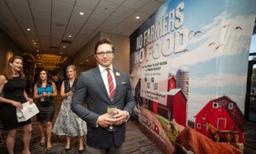As the Biden administration and governments worldwide make massive commitments to rapidly decarbonize the global economy, the persistent effort to silence climate change skeptics is intensifying—and the critics keep pushing back.
The climate dissenters are pressing their case as President Biden, United Nations officials, and climate action advocates in media and academia argue that the “settled science” demands a wholesale societal transformation. That means halving U.S. carbon emissions by 2035 and achieving net zero emissions by 2050 to stave off the “existential threat” of human-induced climate change.
Many of these climate skeptics reject the optimistic scenarios of economic prosperity promised by advocates of a net-zero world order. They say the global emissions-reduction targets are not achievable on such an accelerated timetable without lowering living standards and unleashing worldwide political unrest.
“What advocates of climate action are trying to do is scare the bejesus out of the public so they’ll think we need to [act] fast,” said Steven Koonin, author of “Unsettled: What Climate Science Tells Us, What It Doesn’t, and Why It Matters.”
“You have to balance the certainties and uncertainties of the changing climate—the risks and hazards—against many other factors,” he adds.
They also say it is a troubling sign for scientific integrity that they are systematically sidelined and diminished by government funding agencies, foundation grant-makers, academic journals, and much of the media. Delving into their claims, RealClearInvestigations (RCI) reviewed a sampling of their books, articles, and podcast interviews. This loose coalition of writers and thinkers acknowledges that the climate is warming, but they typically ascribe as much, if not more, influence to natural cycles and climate variability than to human activities, such as burning fossil fuel.
- There is no climate crisis or existential threat as expressed in catastrophic predictions by activists in the media and academia. As global temperatures gradually increase, human societies will need to make adjustments in the coming century, just as societies have adapted to earlier climate changes. By and large, humans cannot control the climate, which Pielke describes as “the fanciful idea that emissions are a disaster control knob.”
- Global temperatures are increasing incrementally, and have been for centuries, but the degree of human influence is uncertain or negligible. Climate skeptics themselves don’t agree on how much humans are contributing to global warming by burning fossil fuels, and how much is caused by natural variability from El Niño and other cycles that can take centuries to play out. “The real question is not whether the globe has warmed recently,” writes Koonin, “but rather to what extent this warming is being caused by humans.”
- Rapidly replacing fossil fuels with renewables and electricity by mid-century would be economically risky and may have a negligible effect on global warming. Some say mitigation decrees—such as phasing out the combustion engine and banning gas stoves—are not likely to prevent climate change because humans play a minor role in global climate trends. Others say mitigation is necessary but won’t happen without capable replacement technologies. It’s unrealistic, they say, to force societies to rely on intermittent energy from wind and solar, or wager the future on technologies that are still in experimental stages.
- The global political push to kill the fossil fuel industry to get to “net zero” and “carbon neutrality” by 2050, as advocated by the United Nations and the Biden administration, will erase millions of jobs and raise energy costs, leading to a prolonged economic depression and political instability. The result would be that developing regions will pay the highest price, while the biggest polluters (China and India) and hostile nations (like Russia and Iran) will simply ignore the net-zero mandate. This could be a case where the cure could be worse than the disease.
- Despite the common refrain in the media, there is no evidence that a gradually warming planet is affecting the frequency or intensity of hurricanes, storms, droughts, rainfall, or other weather events. The United Nations’ Intergovernmental Panel on Climate Change has expressed low confidence such weather events can be linked to human activities. Still, “it is a fertile field for cherry pickers,” notes Pielke.
- Extreme weather events, such as wildfires and flooding, are not claiming more human lives than previously. The human death toll is largely caused by cold weather, which accounts for eight times as many deaths as hot weather, and overall weather-related mortality has fallen by about 99 percent in the past century. “People are safer from climate-related disasters than ever before,” statistician and author Bjørn Lomborg has said.
- Climate science has been hijacked and politicized by activists, creating a culture of self-censorship that’s enforced by a code of silence that Koonin likens to the Mafia’s omerta. In her 2023 book, “Climate Uncertainty and Risk,” climatologist Judith Curry asks: “How many skeptical papers were not published by activist editorial boards? How many published papers have buried results in order to avoid highlighting findings that conflict with preferred narratives? I am aware of anecdotal examples of each of these actions, but the total number is unknowable.”
- Slogans such as “follow the science” and “scientific consensus” are misleading and disingenuous. There is no consensus on many key questions, such as the urgency to cease and desist burning fossil fuels, or the accuracy of computer modeling predictions of future global temperatures. The apparent consensus of imminent disaster is manufactured through peer pressure, intimidation, and research funding priorities, based on the conviction that “noble lies,” “consensus entrepreneurship,” and “stealth advocacy” are necessary to save humanity from itself. “One day PhD dissertations will be written about our current moment of apocalyptic panic,” Pielke predicts.
- The warming of the planet is a complicated phenomenon that will cause some disruptions but will also bring benefits, particularly in agricultural yields and increased vegetation. Some climate skeptics, including the CO2 Coalition, say CO2 is not a pollutant—it is “plant food.”
Curry, the former Chair of Earth and Atmospheric Sciences at the Georgia Institute of Technology, expresses a common theme among the climate refuseniks: that they are the sane, rational voices in a maelstrom of quasi-religious mania.
“In the 1500s, they used to drown witches in Europe because they blamed them for bad weather. You had the pagan people trying to appease the gods with sacrifices,” Curry said. “What we’re doing now is like a pseudoscientific version of that, and it’s no more effective than those other strategies.”
“Today, there is general agreement that our current media environment and political discourse are rife with misinformation,” Pielke testified. “If there is just one sentence that you take from my testimony today it is this: You are being misinformed.”





